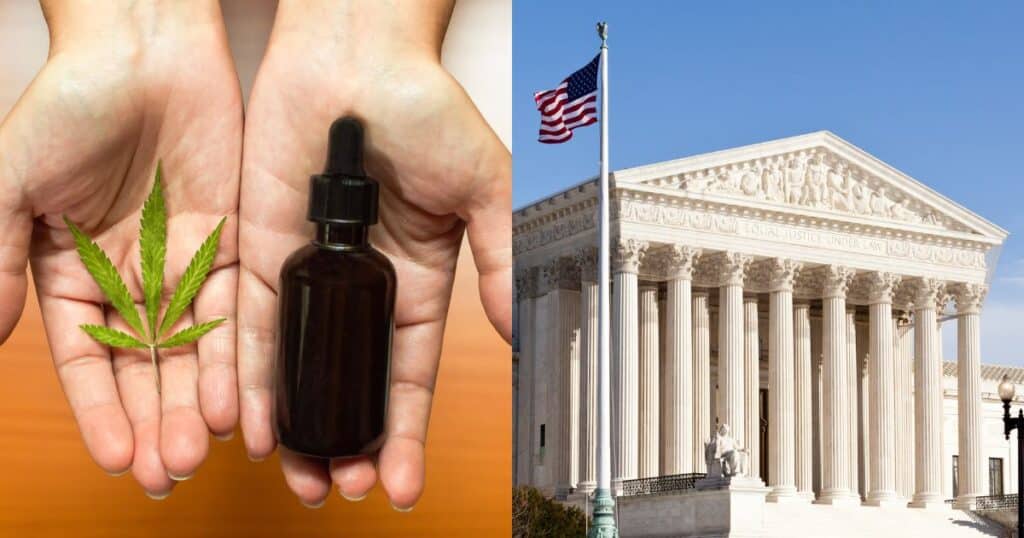In a case that could set a precedent for employment law and the CBD industry, the U.S. Supreme Court recently heard arguments involving Douglas Horn, a commercial truck driver who was terminated after failing a drug test due to a CBD product. The case raises significant questions about the intersection of federal laws, employment rights, and the growing acceptance of cannabis-derived products.
Rise of CBD and Its Legal Challenges
Cannabidiol, commonly known as CBD, has seen a meteoric rise in popularity due to its health benefits without the psychoactive effects of THC, the compound found in marijuana. However, as more people turn to CBD products like tinctures and oils for relief from pain and other ailments, legal issues are emerging, especially concerning employment and drug testing.
CBD products have been marketed for their therapeutic properties, often claiming to contain no THC. This assurance has led many consumers, including professionals subject to regular drug testing, to use these products confidently. Unfortunately, as seen in Horn’s case, not all products are free of THC.
Douglas Horn vs. Medical Marijuana Inc.: Supreme Court Case on CBD Elixir Firing
Douglas Horn, a seasoned truck driver, found himself in a complicated legal battle after using a CBD tincture, Dixie X, marketed as THC-free. Following a random drug test, Horn tested positive for THC and was subsequently fired. Horn argues the ramifications of this incident were significant, affecting his livelihood and prompting him to take legal action against Medical Marijuana Inc., the company behind the CBD product.
Horn filed a lawsuit under the Racketeer Influenced and Corrupt Organizations (RICO) Act, a law initially designed to combat organized crime. The crux of his argument is that the product’s mislabeling constituted an act of fraud that resulted in harm to his business or property, i.e., his employment.
Legal Debate on CBD at the Supreme Court
The Supreme Court’s involvement in this case underscores the legal ambiguities surrounding CBD products. The central question is whether Horn can pursue damages under RICO, which allows for triple damages for injuries to business or property due to racketeering activities. The interpretation of what constitutes “business or property” injury is hotly contested.
During Tuesday’s proceedings, as reported by Reuters the Supreme Court appeared notably divided on the issue, reflecting the complex nature of integrating cannabis-based CBD products within existing employment laws. The justices’ questions and comments indicated an ideological split, with some justices demonstrating skepticism toward expanding the reach of RICO to include employment-related claims.
Others seemed more receptive to the argument that a misrepresentation leading to employment loss aligns with the harms RICO seeks to address. Highlighting the uncertainty surrounding the case, leaving stakeholders in anticipation.
Justice Kavanaugh and other conservative members of the court expressed concern about expanding RICO’s scope to cover employment-related injuries. Meanwhile, Justice Kagan pointed out that the potential loss of employment could qualify as business harm, aligning with RICO’s provisions.
Closer Look at the RICO Act
The RICO Act, enacted in 1970, aimed to dismantle organized crime syndicates by allowing prosecutors to target entire organizations instead of just individuals. However, its civil provisions enable private lawsuits for damages resulting from racketeering activities, broadening its application beyond its original intent.
The current case hinges on whether mislabeling a CBD product constitutes racketeering, given the allegations of mail and wire fraud. The decision could redefine the application of RICO, potentially expanding its reach into product liability and consumer protection cases.
The outcome of this case could substantially impact how CBD companies do business. For businesses, a ruling in favor of Horn could mean increased liability and the potential for a surge in lawsuits related to CBD and other cannabinoid-derived products. Companies might need to re-evaluate their drug-testing policies and consider clearer guidelines regarding CBD use.
Accurate labeling not only protects consumers but also shields companies from legal challenges that can damage reputations and financial stability. The Horn case serves as a cautionary tale for the industry to prioritize transparency and compliance with existing regulations.
The interplay between state and federal laws complicates the legal landscape for CBD. While many states have embraced the use of CBD and marijuana, federal regulations remain strict, particularly concerning THC.
This case highlights the need for comprehensive federal guidelines that align with state laws to provide clarity and consistency for businesses and consumers. Such alignment could prevent legal disputes and encourage the responsible development and use of CBD products.
The Supreme Court’s deliberation on this case could have far-reaching implications for the CBD industry, employment law, and consumer rights. It highlights the challenges of navigating the intersection of emerging products and existing legal frameworks.























